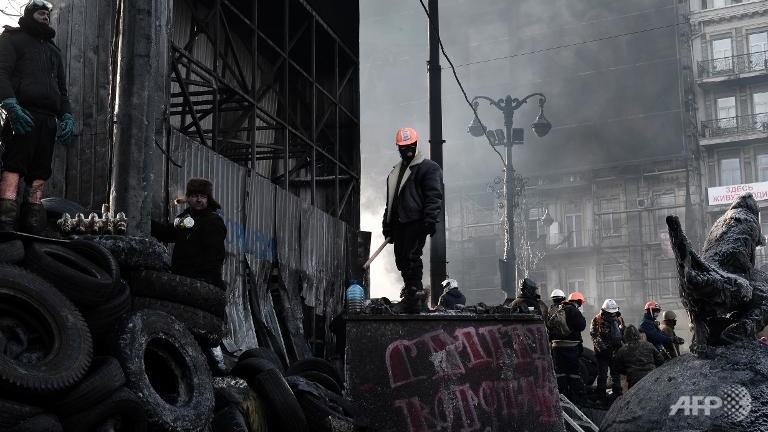Ukraine protests spread as opposition snubs compromise offer

Ukrainian anti-government protesters stand at a road block in Kiev. (AFP/Aris Messinis)
KIEV: The Ukrainian opposition on Sunday said a compromise deal offered by President Viktor Yanukovych was not enough to end the country's worst crisis since independence as nationwide protests spread to the president's eastern heartland.
With Ukraine shaken by a week of violence between police and protesters, all three main Ukrainian opposition leaders personally attended the Kiev funeral of one of three activists confirmed to have been shot dead in the unrest.
The protests began over two months ago over Yanukovych's rejection of a pact with the European Union under Russian pressure but have now turned into an all-out bid to oust him from power.
Tensions remained high in Kiev as several dozen protesters seized control late Sunday of the Justice Ministry, smashed windows and erected barricades based around rubbish containers outside, an AFP correspondent reported.
Europe has urged dialogue between the two sides - a call echoed by Pope Francis who voiced hope in his weekly Angelus prayer on St Peter's Square that "the search for common good may prevail in the hearts of all".
Under unprecedented pressure, Yanukovych late Saturday offered the opposition posts in government including that of prime minister but his opponents said that the offer fell short of what they needed.
Yanukovych offered to share leadership with Fatherland party leader Arseniy Yatsenyuk as prime minister and UDAR (Punch) chief and world boxing champion Vitali Klitschko as deputy prime minister.
Klitschko, who is believed to have a personal rivalry with Yatsenyuk, branded the proposals "poisoned" in an interview with German newspaper Bild am Sonntag.
"This was a poisoned offer by Yanukovych designed to split our opposition movement," he was quoted as saying.
Opposition leaders have been careful, however, neither accepting nor explicitly rejecting Yanukovych's proposals. They have said talks will continue although it is not clear exactly when.
Yanukovych's office has also said the president is willing to consider constitutional changes to reduce his power and return to a system according more authority to the prime minister.
A crucial day in the standoff is expected to be on Tuesday when parliament will meet in extraordinary session to debate key sticking points in the crisis, including possible changes to key protest laws.
Yanukovych has notably failed to respond to the key opposition demand of bringing forwards presidential elections due in 2015 and has also shown no sign of releasing jailed opposition leader Yulia Tymoshenko.
"We want the authorities to understand that we will stay until victory, and most of us see that as the departure of Yanukovych," said protester Bogdan, 22.
Thousands of activists meanwhile laid siege to local government offices in four Ukrainian cities including the eastern hub of Dniepropetrovsk, Sumy in the northeast and Zaporizhya in the southeast that have in the past been sympathetic to Yanukovych.
Police used batons and stun grenades to break up the rally in Zaporizhya, causing injuries, local media said.
Protesters have already occupied regional administrations in 10 Ukrainian regions to protest against Yanukovych-appointed governors.
De facto powers in the occupied regional centres have passed to local pro-opposition lawmakers or improvised "People's Parliaments" set up by the protesters themselves.
In two regions, Ivano-Frankivsk and Ternopil, local parliaments even approved motions to ban the ruling Party of Regions in a symbolic move that echoed the outlawing of the Communist Party after the fall of the Soviet Union.
An emotional crowd packed Saint Michael's Cathedral for the Orthodox funeral to pay their last respects to 25-year-old Mikhail Zhiznevsky, who lost his life at the height of the clashes Wednesday.
Mourners bearing flowers and waving Ukrainian flags hailed the Belarussian national, who had been living in Ukraine for several years, as a hero of their country and noted that Sunday would have been his 26th birthday.
"He was a very brave, very kind person who gave his life for the future of Ukraine," one mourner, Iryna Davydova, told AFP at the ceremony which was attended by Klitschko and other opposition leaders.
Western leaders expressed alarm over the crisis, which appears set to have a decisive effect on the country's future strategic orientation.
German Foreign Minister Frank-Walter Steinmeier described the situation as "not only tense but truly serious", adding: "The coming days could decide Ukraine's path into the future."
British Foreign Secretary William Hague told BBC television he was "very worried" and emphasised the protest movement should not be seen as "an East-West struggle" with Russia.
What the stars mean:
★ Poor ★ ★ Promising ★★★ Good ★★★★ Very good ★★★★★ Exceptional
Latest News
More News
- Russian President congratulates Vietnamese Party leader during phone talks (January 25, 2026 | 09:58)
- Worldwide congratulations underscore confidence in Vietnam’s 14th Party Congress (January 23, 2026 | 09:02)
- Political parties, organisations, int’l friends send congratulations to 14th National Party Congress (January 22, 2026 | 09:33)
- 14th National Party Congress: Japanese media highlight Vietnam’s growth targets (January 21, 2026 | 09:46)
- 14th National Party Congress: Driving force for Vietnam to continue renewal, innovation, breakthroughs (January 21, 2026 | 09:42)
- Vietnam remains spiritual support for progressive forces: Colombian party leader (January 21, 2026 | 08:00)
- Int'l media provides large coverage of 14th National Party Congress's first working day (January 20, 2026 | 09:09)
- Vietnamese firms win top honours at ASEAN Digital Awards (January 16, 2026 | 16:45)
- ASEAN Digital Ministers' Meeting opens in Hanoi (January 15, 2026 | 15:33)
- ASEAN economies move up the global chip value chain (December 09, 2025 | 13:32)
















 Mobile Version
Mobile Version